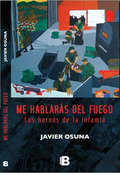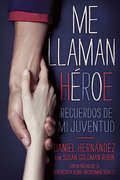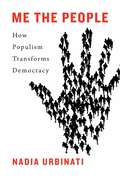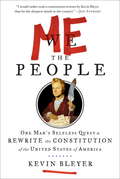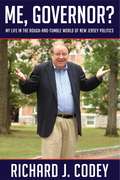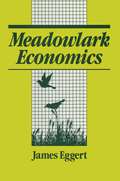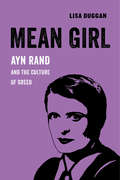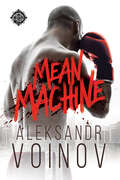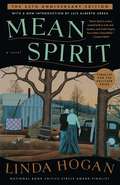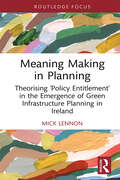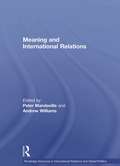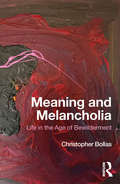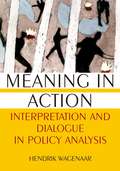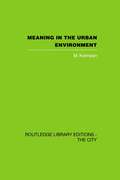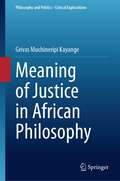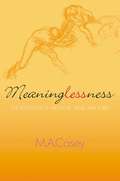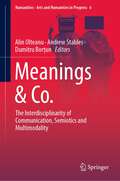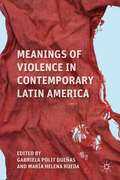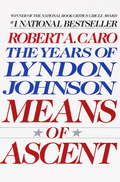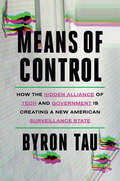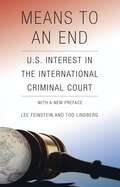- Table View
- List View
Me hablarás del fuego: Los hornos de la infamia
by Javier Osuna SarmientoUn valiente testimonio sobre la barbarie paramilitar. Me hablarás del fuego es un valioso testimonio periodistico y humano sobre la barbarie paramilitar acaecida con los hornos crematorios en Norte de Santander. Javier Osuna, el investigador, ha sido amenazado y perseguido, pero su voluntad de hierro lo llevó a rastrear las identidades de las víctimas y a escribir un relate para que lo que ocurrió no vuelva a suceder jamás.
Me llaman heroe (They Call Me a Hero)
by Susan Goldman Rubin Daniel Hernandez Carlos VerdeciaDaniel Hernandez helped save the life of Congresswoman Gabrielle Giffords, and his life experience is a source of true inspiration in this heartfelt memoir, told in Spanish."I don't consider myself a hero," says Daniel Hernandez. "I did what I thought anyone should have done. Heroes are people who spend a lifetime committed to helping others." When Daniel Hernandez was twenty years old, he was working as an intern for U.S. Representative Gabrielle Giffords. On January 8, 2011, during a "Congress on Your Corner" event, Giffords was shot. Daniel Hernandez's quick thinking saved Giffords's life until the paramedics arrived and took her to the hospital. Hernandez's bravery and heroism has been noted by many, including President Barack Obama. But while that may have been his most well-known moment in the spotlight, Daniel Hernandez, Jr., is a remarkable individual who has already accomplished much in his young life, and is working to achieve much more. This memoir, told in Spanish, explores Daniel's life, his character, and the traits that a young person needs to rise above adversity and become a hero like Daniel.
Me the People: How Populism Transforms Democracy
by Nadia UrbinatiPopulism suddenly is everywhere, and everywhere misunderstood. Nadia Urbinati argues that populism should be regarded as government based on an unmediated relationship between the leader and those defined as the “good” or “right” people. Mingling history, theory, and current affairs, Urbinati illuminates populism’s tense relation to democracy.
Me the People: One Man's Selfless Quest to Rewrite the Constitution of the United States of America
by Kevin BleyerThe United States Constitution promised a More Perfect Union. It's a shame no one bothered to write a more perfect Constitution--one that didn't trigger more than two centuries of arguments about what the darn thing actually says. Until now. Perfection is at hand. A new, improved Constitution is here. And you are holding it. But first, some historical context: In the eighteenth century, a lawyer named James Madison gathered his friends in Philadelphia and, over four long months, wrote four short pages: the Constitution of the United States of America. Not bad. In the nineteenth century, a president named Abraham Lincoln freed an entire people from the flaws in that Constitution by signing the Emancipation Proclamation. Pretty impressive. And in the twentieth century, a doctor at the Bethesda Naval Hospital delivered a baby--but not just any baby. Because in the twenty-first century, that baby would become a man, that man would become a patriot, and that patriot would rescue a country . . . by single-handedly rewriting that Constitution. Why? We think of our Constitution as the painstakingly designed blueprint drawn up by, in Thomas Jefferson's words, an "assembly of demigods" who laid the foundation for the sturdiest republic ever created. The truth is, it was no blueprint at all but an Etch A Sketch, a haphazard series of blunders, shaken clean and redrawn countless times during a summer of petty debates, drunken ramblings, and desperate compromise--as much the product of an "assembly of demigods" as a confederacy of dunces. No wonder George Washington wished it "had been made more perfect." No wonder Benjamin Franklin stomached it only "with all its faults." The Constitution they wrote is a hot mess. For starters, it doesn't mention slavery, or democracy, or even Facebook; it plays favorites among the states; it has typos, smudges, and misspellings; and its Preamble, its most famous passage, was written by a man with a peg leg. Which, if you think about it, gives our Constitution hardly a leg to stand on. [Pause for laughter.] Now stop laughing. Because you hold in your hands no mere book, but the most important document of our time. Its creator, Daily Show writer Kevin Bleyer, paid every price, bore every burden, and saved every receipt in his quest to assure the salvation of our nation's founding charter. He flew to Greece, the birthplace of democracy. He bused to Philly, the home of independence. He went toe-to-toe (face-to-face) with Scalia. He added nightly confabs with James Madison to his daily consultations with Jon Stewart. He tracked down not one but two John Hancocks--to make his version twice as official. He even read the Constitution of the United States. So prepare yourselves, fellow patriots, for the most significant literary event of the twenty-first, twentieth, nineteenth, and latter part of the eighteenth centuries. Me the People won't just form a More Perfect Union. It will save America.
Me, Governor? My Life in the Rough-and-Tumble World of New Jersey Politics
by Stephen Seplow Richard J. CodeyAnd so, a new chapter in the life of Richard J. Codey, an undertaker's son born and bred in the Garden State, began on the night of August 12, 2004--he knew from that point his life would never be the same ... and it hasn't been. His memoir is a breezy, humorous, perceptive, and candid chronicle of local and state government from a man who lived among political movers and shakers for more than three decades. Codey became governor of New Jersey, succeeding James McGreevey, who resigned following a homosexual affair--a shattering scandal and set of circumstances that were bizarre, even for the home state of the Sopranos. At once a political autobiography, filled with lively, incisive anecdotes that record how Codey restored respectability and set a record for good politics and good government in a state so often tarnished, this is also the story about a man and his family.
Meadowlark Economies: Work and Leisure in the Ecosystem
by Jim EggertFirst Published in 2017. The author shares their feelings about enjoying and preserving the natural environment, yet this book also reveals a conflict in values that the most committed ecologist must face. Such conflict pits the powerful American values of individual freedom and rights against the values of community necessary for sustaining the environment. In publishing this collection of essays, the author hopes to contribute to more enlightened economic analysis and more relevant and effective policies that are good for both the economy and the global ecology.
Mean Girl: Ayn Rand and the Culture of Greed (American Studies Now: Critical Histories of the Present #8)
by Lisa DugganAyn Rand’s complicated notoriety as popular writer, leader of a political and philosophical cult, reviled intellectual, and ostentatious public figure endured beyond her death in 1982. In the twenty-first century, she has been resurrected as a serious reference point for mainstream figures, especially those on the political right from Paul Ryan to Donald Trump. Mean Girlfollows Rand’s trail through the twentieth century from the Russian Revolution to the Cold War and traces her posthumous appeal and the influence of her novels via her cruel, surly, sexy heroes. Outlining the impact of Rand’s philosophy of selfishness, Mean Girlilluminates the Randian shape of our neoliberal, contemporary culture of greed and the dilemmas we face in our political present.
Mean Machine
by Aleksandr VoinovFor a boxer ravaged by guilt and in deep denial of his desires, a fight beyond the ring might yield his greatest prize. In a dystopian UK devastated by austerity and ruled by corporate interests, Brooklyn Marshall was a happily married London police officer—until an accident resulted in the death of a protester connected to a powerful family. Now he takes out his anger and pain on his opponents, fighting for the company that took him into stewardship after his conviction and disgrace—and which all but owns him. Wealthy barrister Nathaniel Bishop fulfills his dream of a family when he adopts a daughter. He can’t resist researching her allegedly violent criminal father, but Brook isn’t at all what he expects. He’s fascinating… and maybe worthy of redemption. Through legal sleight of hand, Nathaniel thinks he can overturn Brook’s conviction. Brook has learned the hard way not to trust anyone, let alone a privileged man who’s purchased his “time.” But as they get to know each other, he allows himself to hope. With his fights getting deadlier, hope might be the only thing to carry Brook through.
Mean Spirit: A Novel
by Linda HoganFINALIST FOR THE PULITZER PRIZE * Named a Best Mystery and Thriller Book of all Time by Time A haunting epic following a Native American government official who investigates the murder of Grace Blanket: an Osage woman who was once the richest person in her territory until the greed of white men led to her death and a future of uncertainty for her family.When rivers of oil are discovered beneath the land belonging to the Osage tribe during the Oklahoma oil boom, Grace Blanket becomes the wealthiest person in the territory. Tragically, she is murdered at the hands of greedy men, leaving her daughter Nola orphaned. After the Graycloud family takes Nola in, they too begin dying mysteriously. Though they send letters to Washington DC begging for help, the family continues to slowly disappear until Native American government official Stace Red Hawk ventures west to investigate the terrors plaguing the Osage tribe. Stace is not only able to uncover the rampant fraud, intimidation, and murder that led to the deaths of Grace Blanket and the Greycloud family, but also finds something truly extraordinary—a realization of his deepest self and an abundance of love and appreciation for his native people and their brave past.
Meaning Making in Planning: Theorising ‘Policy Entitlement’ in the Emergence of Green Infrastructure Planning in Ireland
by Mick LennonPlanning theorists normally focus on issues of contest and critique. The field of planning theory is thereby replete with studies of conflict, collaboration and criticism. Considerably less critical attention is afforded to policy approaches that emerge, evolve and are widely adopted in the apparent absence of discord. This book addresses this knowledge gap. A case study of the emergence of green infrastructure policy in Ireland is used to both inform and illustrate a theory of ‘Policy Entitlement’. This interpretive approach focuses on meaning making in context to explain the counter-intuitive processes through which a new policy concept can emerge and reprofile planning activities by producing the seemingly pre-existing objective reality to which such policy is then applied and the discipline (re)orientated. This approach accounts for how a new planning concept can appear to resolve problematic policy ambiguity by suspending disagreement on issues where dispute could be expected. This book will be of interest to those studying planning theory and the policy process, as well as those concerned with the undertheorized but swift rise to prominence of green infrastructure planning.
Meaning and International Relations (Routledge Advances in International Relations and Global Politics)
by Andrew Williams Peter MandavilleThis innovative volume brings together specialists in international relations to tackle a set of difficult questions about what it means to live in a globalized world where the purpose and direction of world politics are no longer clear-cut. What emerges from these essays is a very clear sense that while we may be living in an era that lacks a single, universal purpose, ours is still a world replete with meaning. The authors in this volume stress the need for a pluralistic conception of meaning in a globalized world and demonstrate how increased communication and interaction in transnational spaces work to produce complex tapestries of culture and politics. Meaning and International Relations also makes an original and convincing case for the relevance of hermeneutic approaches to understanding contemporary international relations.
Meaning and Melancholia: Life in the Age of Bewilderment
by Christopher BollasMeaning and Melancholia: Life in the Age of Bewilderment sees Christopher Bollas apply his creative and innovative psychoanalytic thinking to various contemporary social, cultural and political themes. This book offers an incisive exploration of powerful trends within, and between, nations in the West over the past two hundred years. The author traces shifts in psychological forces and ‘frames of mind’, that have resulted in a crucial ‘intellectual climate change’. He contends that recent decades have seen rapid and significant transformations in how we define our ‘selves’, as a new emphasis on instant connectedness has come to replace reflectiveness and introspection. Bollas argues that this trend has culminated in the current rise of psychophobia; a fear of the mind and a rejection of depth psychologies that has paved the way for what he sees as hate based solutions to world problems, such as the victory of Trump in America and Brexit in the United Kingdom. He maintains that, if we are to counter the threat to democracy posed by these changes and refind a more balanced concept of the self within society, we must put psychological insight at the heart of a new kind of analysis of culture and society. This remarkable, thought-provoking book will appeal to anyone interested in politics, social policy and cultural studies, and in the gaining of insight into the ongoing challenges faced by the Western democracies and the global community.
Meaning in Action: Interpretation and Dialogue in Policy Analysis
by Hendrik WagenaarThis accessible book gives academics, graduate students, and researchers a comprehensive overview of the vast, varied, and often confusing landscape of interpretive policy analysis. It is both theoretically informed and clear and jargon-free as it discusses the specific strengths and weaknesses of different interpretive approaches--all with a practical orientation towards doing policy analysis
Meaning of Justice in African Philosophy (Philosophy and Politics - Critical Explorations #28)
by Grivas Muchineripi KayangeThe book examines the meaning of justice in African political philosophy, building on the use-theoretical approach. Currently, most of the philosophical works in this context advocate for a communal interpretation of the meaning of justice, such as the 'relational theory of justice' and 'Ubuntu justice as fairness.' The author argues that this foundation of justice in the community undermines the self, which is a major problem with these theories. As an attempt to go beyond communitarianism in African thought, the book recognizes other philosophical frameworks for elaborating the meaning of justice in ordinary people's experience, such as vitalism, theism, ubuntuism, and semantic framework. The author opts for a reconstructed ubuntu-based theory of the meaning of justice that reflects the traditional African experience and recuperates 'valuing self-existence' and 'valuing other-existence' as its foundations. The book further identifies the centrality of rights in defining justice in traditional African communities.
Meaningful Philanthropy: The Person Behind the Giving
by Adrian Sargeant Jen ShangWith unparalleled access to some of the world’s most reflective and thoughtful philanthropists, this book explores the philanthropic journeys of 48 high net worth individuals (HNWIs) and ultra-high net worth individuals (UHNWIs) to uncover the person behind the giving. Their stories reveal the difference between the meaning they experience and the impact their philanthropy makes. Through the lens of philanthropic psychology, the authors examine how philanthropists experience their giving and the psychological challenges they need to overcome. This fascinating book provides a unique guide for new and experienced philanthropists and their trusted advisers and fundraisers in the creation of more meaningful philanthropic experiences.
Meaningless Citizenship: Iraqi Refugees and the Welfare State
by Sally Wesley BonetA searing critique of the &“freedom&” that America offers to the victims of its imperialist machinations of war and occupation Meaningless Citizenship traces the costs of America&’s long-term military involvement around the world by following the forced displacement of Iraqi families, unveiling how Iraqis are doubly displaced: first by the machinery of American imperialism in their native countries and then through a more pernicious war occurring on U.S. soil—the dismantling of the welfare state.Revealing the everyday struggles and barriers that texture the lives of Iraqi families recently resettled to the United States, Sally Wesley Bonet draws from four years of deep involvement in the refugee community of Philadelphia. An education scholar, Bonet&’s analysis moves beyond the prevalent tendency to collapse schooling into education. Focusing beyond the public school to other critical institutions, such as public assistance, resettlement programs, and healthcare, she shows how encounters with institutions of the state are an inherently educative process for both refugee youths and adults, teaching about the types of citizenship they are expected to enact and embody while simultaneously shaping them into laboring subjects in service of capitalism. An intimate, in-depth ethnography, Meaningless Citizenship exposes how the veneer of American values—freedom, democracy, human rights—exported to countries like Iraq, disintegrates to uncover what is really beneath: a nation-state that prioritizes the needs of capitalism above the survival and wellbeing of its citizens.
Meaninglessness
by M. A. CaseyWhat would the world be like if we no longer needed meaning? Australian sociologist Michael Casey's revealing work charts the collapse of the metaphysical world and the innate human need for meaning. With the decline of Christianity and the demise of secular universalism in the west, the meaning and value of metaphysical culture has been replaced by an entirely new post-metaphysical world. <p><p> In Meaninglessness, Casey revisits the social theory of Nietzsche, Freud, and Rorty, in order to conceive how this post-metaphysical culture may take shape in the third millennium. Framing questions of enduring significance to contemporary social and political theory in a new methodological light, this work will appeal to scholars and general readers interested in sociology, post-modernism, cultural studies, political theory, and philosophy.
Meanings & Co.: The Interdisciplinarity of Communication, Semiotics and Multimodality (Numanities - Arts and Humanities in Progress #6)
by Alin Olteanu Andrew Stables Dumitru BorţunThis book explores the interdisciplinarity of semiotics and communication studies, comprising both theoretical explorations and semiotic applications to communication with theoretical bearings. These disciplines have generally been understood as mutually implicit, but there still are many unexplored research avenues in this area, particularly on a conceptual level. The book offers broad insights into the epistemological relations between semiotics and other approaches to communication from perspectives such as sociology, philosophy of language and communication theory. As such, it sheds light on the communication of knowledge.Semiotics is currently enjoying increasing popularity within the humanities and social sciences. Understood as relational logic (Charles Peirce) or hermeneutics (structuralism and poststructuralism), semiotics fundamentally implies certain positions with regard to communication. Because of the generality and conceptual vagueness of semiosis and communication, how one elucidates the other is still an underexplored theme. With some pioneering studies of this relation, the books examines various fields, such as language, code, learning, embodiment, political communication, media, cinema, cuisine, multimodality and intertextuality.
Meanings of Violence in Contemporary Latin America
by Gabriela Polit Dueñas María Helena RuedaThis volume includes contributions of scholars from various fields - the social sciences, journalism, the humanities and the arts - whose work offers insightful and innovative ways to understand the devastating and unprecedented forms of violence currently experienced in Latin America. As an interdisciplinary endeavor, it offers an array of perspectives that contribute to ongoing debates in the study of violence in the region.
Means Without End: Notes on Politics (Theory Out of Bounds #20)
by Giorgio AgambenAn essential reevaluation of the proper role of politics in contemporary life. In this critical rethinking of the categories of politics within a new sociopolitical and historical context, the distinguished political philosopher Giorgio Agamben builds on his previous work to address the status and nature of politics itself. Bringing politics face-to-face with its own failures of consciousness and consequence, Agamben frames his analysis in terms of clear contemporary relevance. He proposes, in his characteristically allusive and intriguing way, a politics of gesture—a politics of means without end.Among the topics Agamben takes up are the "properly" political paradigms of experience, as well as those generally not viewed as political. He begins by elaborating work on biopower begun by Foucault, returning the natural life of humans to the center of the polis and considering it as the very basis for politics. He then considers subjects such as the state of exception (the temporary suspension of the juridical order); the concentration camp (a zone of indifference between public and private and, at the same time, the secret matrix of the political space in which we live); the refugee, who, breaking the bond between the human and the citizen, moves from marginal status to the center of the crisis of the modern nation-state; and the sphere of pure means or gestures (those gestures that, remaining nothing more than means, liberate themselves from any relation to ends) as the proper sphere of politics. Attentive to the urgent demands of the political moment, as well as to the bankruptcy of political discourse, Agamben’s work brings politics back to life, and life back to politics.Giorgio Agamben teaches philosophy at the Collège International de Philosophie in Paris and at the University of Macerata in Italy. He is the author of Language and Death (1991), Stanzas (1992), and The Coming Community (1993), all published by the University of Minnesota Press.
Means of Ascent: The Years of Lyndon Johnson II (The Years of Lyndon Johnson #2)
by Robert A. CaroRobert A. Caro's life of Lyndon Johnson, which began with the greatly acclaimed The Path to Power, also winner of the National Book Critics Circle Award, continues -- one of the richest, most intensive and most revealing examinations ever undertaken of an American President. In Means of Ascent the Pulitzer Prize-winning biographer/historian, chronicler also of Robert Moses in The Power Broker, carries Johnson through his service in World War II and the foundation of his long-concealed fortune and the facts behind the myths he created about it. But the explosive heart of the book is Caro's revelation of the true story of the fiercely contested 1948 senatorial election, for forty years shrouded in rumor, which Johnson had to win or face certain political death, and which he did win -- by "the 87 votes that changed history." Caro makes us witness to a momentous turning point in American politics: the tragic last stand of the old politics versus the new -- the politics of issue versus the politics of image, mass manipulation, money and electronic dazzle.From the Trade Paperback edition.
Means of Control: How the Hidden Alliance of Tech and Government Is Creating a New American Surveillance State
by Byron TauYou are being surveilled right now. This sweeping exposé reveals how the U.S. government allied with data brokers, tech companies, and advertisers to monitor us through the phones we carry and the devices in our home.&“A revealing . . . startling . . . timely . . . fascinating, sometimes terrifying examination of the decline of privacy in the digital age.&”—Kirkus Reviews&“That evening, I was given a glimpse inside a hidden world. . . . An entirely new kind of surveillance program—one designed to track everyone.&”For the past five years—ever since a chance encounter at a dinner party—journalist Byron Tau has been piecing together a secret story: how the whole of the internet and every digital device in the world became a mechanism of intelligence, surveillance, and monitoring.Of course, our modern world is awash in surveillance. Most of us are dimly aware of this: Ever get the sense that an ad is &“following&” you around the internet? But the true potential of our phones, computers, homes, credit cards, and even the tires underneath our cars to reveal our habits and behavior would astonish most citizens. All of this surveillance has produced an extraordinary amount of valuable data about every one of us. That data is for sale—and the biggest customer is the U.S. government.In the years after 9/11, the U.S. government, working with scores of anonymous companies, many scattered across bland Northern Virginia suburbs, built a foreign and domestic surveillance apparatus of breathtaking scope—one that can peer into the lives of nearly everyone on the planet. This cottage industry of data brokers and government bureaucrats has one directive—&“get everything you can&”—and the result is a surreal world in which defense contractors have marketing subsidiaries and marketing companies have defense contractor subsidiaries. And the public knows virtually nothing about it.Sobering and revelatory, Means of Control is the defining story of our dangerous grand bargain—ubiquitous cheap technology, but at what price?
Means to an End
by Tod Lindberg Lee FeinsteinThe International Criminal Court remains a sensitive issue in U.S. foreign policy circles. It was agreed to at the tail end of the Clinton administration, but with serious reservations. In 2002 the Bush administration ceremoniously reversed course and "unsigned" the Rome Statute that had established the Court. But recent developments in Washington and elsewhere indicate that the United States may be moving toward de facto acceptance of the Court and active cooperation in its mission. In Means to an End, Lee Feinstein and Tod Lindberg reassess the relationship of the United States and the ICC, as well as American policy toward international justice more broadly. Praise for the hardcover edition of Means to an End "Books of this sort are all too rare. Two experienced policy intellectuals, one liberal, one conservative, have come together to find common ground on a controversial foreign policy issue.... The book is short, but it goes a long way toward clearing the ideological air." -- Foreign Affairs "A well-researched and timely contribution to the debate over America's proper relationship to the International Criminal Court. Rigorous in its arguments and humane in its conclusions, the volume is an indispensable guide for scholars and policymakers alike." --Madeleine K. Albright, former U.S. Secretary of State"Two of our nation's leading authorities on preventing atrocities have joined to make a convincing argument that closer cooperation with the International Criminal Court will help promote human rights and the values on which America was founded." --Angelina Jolie, co-chair, Jolie-Pitt Foundation
Means to an End
by Tod Lindberg Lee FeinsteinThe International Criminal Court remains a sensitive issue in U.S. foreign policy circles. It was agreed to at the tail end of the Clinton administration, but with serious reservations. In 2002 the Bush administration ceremoniously reversed course and "unsigned" the Rome Statute that had established the Court. But recent developments in Washington and elsewhere indicate that the United States may be moving toward de facto acceptance of the Court and active cooperation in its mission. In Means to an End, Lee Feinstein and Tod Lindberg reassess the relationship of the United States and the ICC, as well as American policy toward international justice more broadly.Praise for the hardcover edition of Means to an End "Books of this sort are all too rare. Two experienced policy intellectuals, one liberal, one conservative, have come together to find common ground on a controversial foreign policy issue.... The book is short, but it goes a long way toward clearing the ideological air." - Foreign Affairs "A well-researched and timely contribution to the debate over America's proper relationship to the International Criminal Court. Rigorous in its arguments and humane in its conclusions, the volume is an indispensable guide for scholars and policymakers alike." -Madeleine K. Albright, former U.S. Secretary of State"Two of our nation's leading authorities on preventing atrocities have joined to make a convincing argument that closer cooperation with the International Criminal Court will help promote human rights and the values on which America was founded." -Angelina Jolie, co-chair, Jolie-Pitt Foundation
